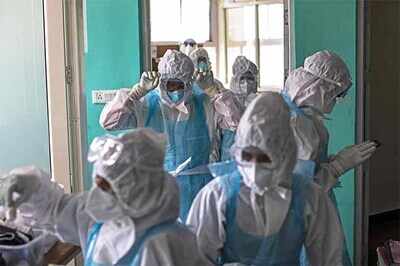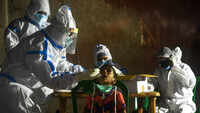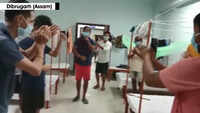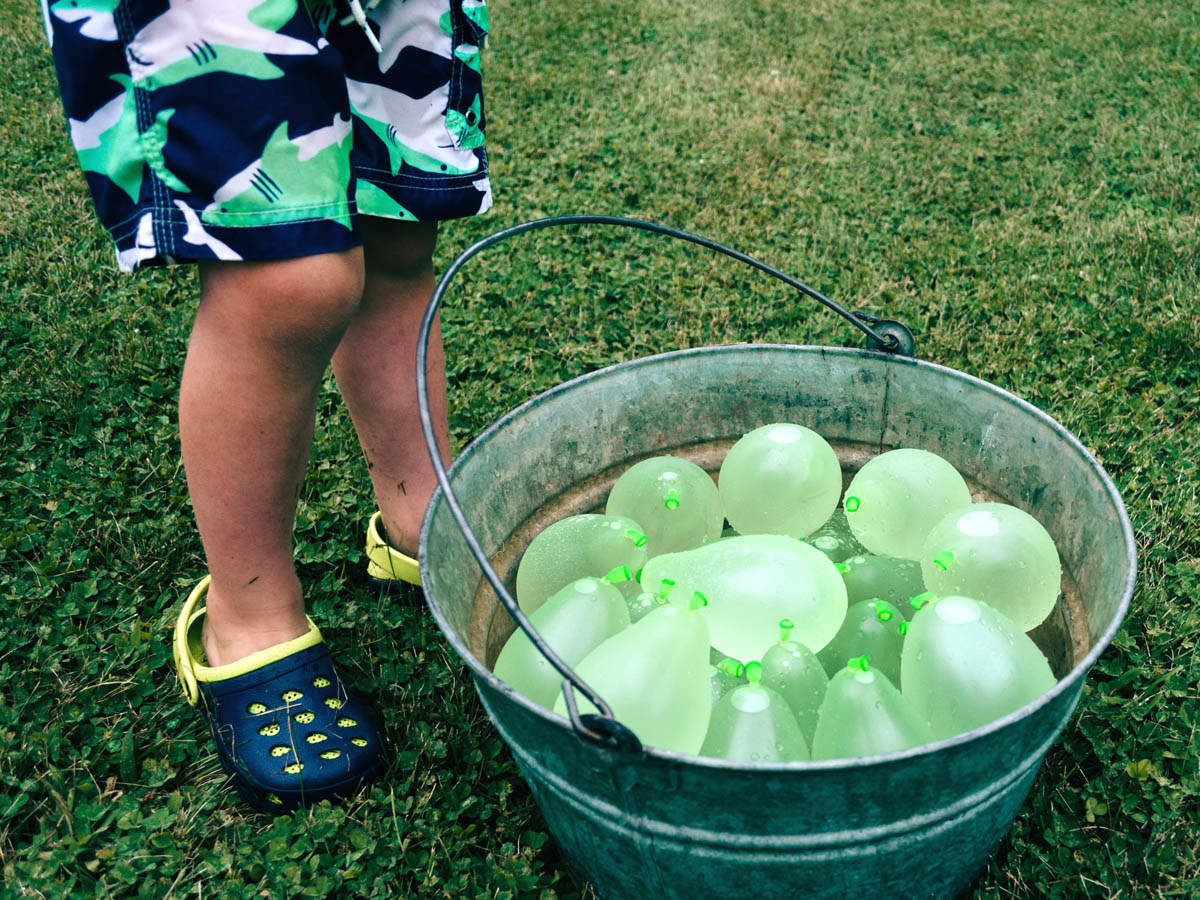
A small study published in May in the Indian Journal Psychiatry reveals how dealing with Covid pandemic is taking a toll on the mental health of doctors. Of the 152 doctors who participated in the study, 60 (or 39.5%) reported experiencing symptoms of anxiety and 53 (34.9%) said they are experiencing depression due to reasons like longer duty hours, involvement in high-risk procedures, washing hands at regular intervals and being ostracised.
In an article published in the Time magazine in May, UN secretary general Antonio Gutteres writes that the Corona virus is not only attacking our physical health but also mental. “…grief at the loss of loved ones; anxiety at the loss of jobs; isolation and restrictions on movement; difficult family dynamics; uncertainty and fear for the future. Each of these on its own can trigger or deepen distress. Today many people are suffering several simultaneously. Healthcare workers are among those most deeply affected,” wrote Gutteres.
While the pressures of the pandemic on the doctors are a bit less now and better managed but the initial chaos of the first two months has taken a toll on their mental health and some are still dealing with its effects.
Dr Prashant Borade works as the head of the critical care unit at Global Hospitals in Mumbai. Since the pandemic started, Dr Borade has seen three of his colleagues leave Global, a Covid hospital, and join a non-Covid facility. “That’s because they couldn't deal with the stress. In treating patients there has to be a trust factor. The patient trusts that she is in able hands. But if the doctor’s mental well-being is getting affected then it’s in the best interest of both the doctor and the patients that the doctor no longer treats them,” says Borade who himself experienced anxiety while being at the forefront of the Covid fight. He even contracted the virus and recovered. “Right now, we have a few doctors who are taking therapy for their symptoms,” says Dr Borade who copes with his anxiety by completely shutting down his mind for two hours every day. He does not think of the hospital, the patients or the pandemic and instead dives into music and other hobbies.
A PG student of obstetrics and gyneacology at LLRM medical college Meerut, Dr Sowmya Gupta admits to being very stressed out. “Reports of 90 doctors dying of Covid in India makes me sad and a little anxious. This being a new disease, a lot remains unknown about it. Also, sometimes the sheer volume of patients makes it difficult to take all precautions all the time. For example, wearing a N95 mask on a 24-hour duty is not possible. Sometimes, while doing surgery in PPE I get drenched in sweat and take off my eye goggles and face shield…it’s a tough time to be a doctor, especially a resident doctor,” says Dr Gupta who admits that she’s also stressed out about missing out on elective surgeries that gave her practice, and her exams have been delayed adding to her anxiety. “My friends are worried about their careers due to exam delay…I miss the carefree days before Covid when the mood in the hospital was one of laughter, healthy competition and learning.”
We may think of doctors as endurance athletes who are used to 30-hour shifts, to death and pain, to blood but statistics show that physicians are twice more likely to die by suicide than the general public. Lorna M Breen, director of emergency department, New York-Presbyterian Allen hospital, died of suicide in April, at the peak of the pandemic in the city.
Even for senior doctors, dealing with a new, unknown disease, uncertainty of the treatment and risk of contracting the infection is making them anxious like never before. Dr Ramakant Panda, cardio-thoracic surgeon and managing director Asian Heart Institute in Mumbais says there’s a lot of helplessness and frustration among doctors for not being able to do anything for the patient dying of Covid 19. “Fear about the disease and the lack of treatment continues. Initially, PPE kits were expensive and very hard to come by. The risk to doctors made their family members vulnerable too,” says Dr Panda. He also observes that the contagious nature of this disease has come in the way of empathy towards patients, which is crucial for giving quality medical care. “In addition, ambiguity in line of treatment and the long and daunting duty hours could impact the physical and emotional comfort that doctors give to patients.”
In many cases of Covid casualties, it is the hospital staff, including doctors, who have performed the last rites of the patients because the family was in quarantine or was also admitted in the hospital. Doctors and nurses have been the last persons to be with patients on their deathbeds holding their hands as they gasp for the last few breaths remaining in them. “These experiences definitely impact your emotional and mental health,” says Dr Borade.
Social ostracisation, like not allowing doctors and nurses to stay in their home or use the common elevator etc, has added to these stresses. Dr Samir Parikh, psychiatrist and director of mental health and behavioral sciences department, Fortis Healthcare, says that what we are seeing now is just the tip of the iceberg and the real impact of Covid will manifest only 7-8 months later.
He has been seeing some doctors in the past two months. "Right now it's a war-like situation and doctors are just going with the flow. They are working in a high-pressure environment and there's way too much uncertainty about health and economy. So, it's natural to feel stress and anxiety. But healthcare providers should do self care and ensure their well-being. It will be good for both them and their patients in the long run," says Dr Parikh.
In an article published in the Time magazine in May, UN secretary general Antonio Gutteres writes that the Corona virus is not only attacking our physical health but also mental. “…grief at the loss of loved ones; anxiety at the loss of jobs; isolation and restrictions on movement; difficult family dynamics; uncertainty and fear for the future. Each of these on its own can trigger or deepen distress. Today many people are suffering several simultaneously. Healthcare workers are among those most deeply affected,” wrote Gutteres.
While the pressures of the pandemic on the doctors are a bit less now and better managed but the initial chaos of the first two months has taken a toll on their mental health and some are still dealing with its effects.
Dr Prashant Borade works as the head of the critical care unit at Global Hospitals in Mumbai. Since the pandemic started, Dr Borade has seen three of his colleagues leave Global, a Covid hospital, and join a non-Covid facility. “That’s because they couldn't deal with the stress. In treating patients there has to be a trust factor. The patient trusts that she is in able hands. But if the doctor’s mental well-being is getting affected then it’s in the best interest of both the doctor and the patients that the doctor no longer treats them,” says Borade who himself experienced anxiety while being at the forefront of the Covid fight. He even contracted the virus and recovered. “Right now, we have a few doctors who are taking therapy for their symptoms,” says Dr Borade who copes with his anxiety by completely shutting down his mind for two hours every day. He does not think of the hospital, the patients or the pandemic and instead dives into music and other hobbies.
A PG student of obstetrics and gyneacology at LLRM medical college Meerut, Dr Sowmya Gupta admits to being very stressed out. “Reports of 90 doctors dying of Covid in India makes me sad and a little anxious. This being a new disease, a lot remains unknown about it. Also, sometimes the sheer volume of patients makes it difficult to take all precautions all the time. For example, wearing a N95 mask on a 24-hour duty is not possible. Sometimes, while doing surgery in PPE I get drenched in sweat and take off my eye goggles and face shield…it’s a tough time to be a doctor, especially a resident doctor,” says Dr Gupta who admits that she’s also stressed out about missing out on elective surgeries that gave her practice, and her exams have been delayed adding to her anxiety. “My friends are worried about their careers due to exam delay…I miss the carefree days before Covid when the mood in the hospital was one of laughter, healthy competition and learning.”
We may think of doctors as endurance athletes who are used to 30-hour shifts, to death and pain, to blood but statistics show that physicians are twice more likely to die by suicide than the general public. Lorna M Breen, director of emergency department, New York-Presbyterian Allen hospital, died of suicide in April, at the peak of the pandemic in the city.
Even for senior doctors, dealing with a new, unknown disease, uncertainty of the treatment and risk of contracting the infection is making them anxious like never before. Dr Ramakant Panda, cardio-thoracic surgeon and managing director Asian Heart Institute in Mumbais says there’s a lot of helplessness and frustration among doctors for not being able to do anything for the patient dying of Covid 19. “Fear about the disease and the lack of treatment continues. Initially, PPE kits were expensive and very hard to come by. The risk to doctors made their family members vulnerable too,” says Dr Panda. He also observes that the contagious nature of this disease has come in the way of empathy towards patients, which is crucial for giving quality medical care. “In addition, ambiguity in line of treatment and the long and daunting duty hours could impact the physical and emotional comfort that doctors give to patients.”
In many cases of Covid casualties, it is the hospital staff, including doctors, who have performed the last rites of the patients because the family was in quarantine or was also admitted in the hospital. Doctors and nurses have been the last persons to be with patients on their deathbeds holding their hands as they gasp for the last few breaths remaining in them. “These experiences definitely impact your emotional and mental health,” says Dr Borade.
Social ostracisation, like not allowing doctors and nurses to stay in their home or use the common elevator etc, has added to these stresses. Dr Samir Parikh, psychiatrist and director of mental health and behavioral sciences department, Fortis Healthcare, says that what we are seeing now is just the tip of the iceberg and the real impact of Covid will manifest only 7-8 months later.
He has been seeing some doctors in the past two months. "Right now it's a war-like situation and doctors are just going with the flow. They are working in a high-pressure environment and there's way too much uncertainty about health and economy. So, it's natural to feel stress and anxiety. But healthcare providers should do self care and ensure their well-being. It will be good for both them and their patients in the long run," says Dr Parikh.
Download
The Times of India News App for Latest India News

Coronavirus outbreak
Trending Topics
LATEST VIDEOS
India
 Selfie trouble: Two girls caught in swelling waters of Pench river
Selfie trouble: Two girls caught in swelling waters of Pench river  Covid-19: India's tally nears 13 lakh with highest single-day spike of 49,310 cases
Covid-19: India's tally nears 13 lakh with highest single-day spike of 49,310 cases  US arrests 3 Chinese nationals for visa fraud
US arrests 3 Chinese nationals for visa fraud  Watch: COVID patients dance, sing at Dibrugarh’s quarantine centre
Watch: COVID patients dance, sing at Dibrugarh’s quarantine centre  'Peaceful border was the pre-requisite for the bilateral relationship', India reminds China
'Peaceful border was the pre-requisite for the bilateral relationship', India reminds China  India and Israel join hands to develop rapid testing for Covid-19 in under 30 secs
India and Israel join hands to develop rapid testing for Covid-19 in under 30 secs
More from TOI
Navbharat Times
Featured Today in Travel
Quick Links
Coronavirus in MumbaiCoronavirus in KolkataCoronavirus in HyderabadCoronavirus in DelhiCoronavirus in BangaloreCoronavirus symptomsCoronavirus in IndiaWhat is CoronavirusCoronavirus NewsSolar EclipseNPRWhat is NRCCAB BillCAB and NRCRTI BillPodcast newsLok SabhaShiv SenaYSRCPCongressBJP newsUIDAIIndian ArmyISRO newsSupreme Court
Get the app



